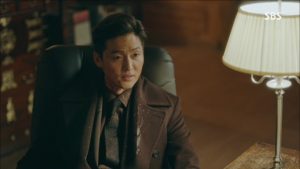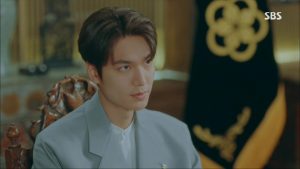
Clearly, the writers and producers of The King: Eternal Monarch wanted to create a second Goblin: The Lonely and Great God. The wonder of parallel worlds and a fantasy setting, the bromance between the male leads, Kim Go-eun as the female lead, the outfits and the coats, and most notably, the lighting and cinematography, all harken back to the 2016 hit starring Gong Yoo. And clearly, the writers and producers of The King: Eternal Monarch failed. In our review of Eps. 1-8, we advised viewers to watch this one for the pretty, not for the plot. By the end of Ep. 16, the finale, that advice has changed. Don’t waste your time, there are better shows you could be watching. Instead of delivering an epic tale of love, and a quest for justice spanning across parallel worlds and surpassing all mathematical improbabilities, The King: Eternal Monarch falls apart at the seams.
The show’s issues are manifold. Most significantly, there is a complete lack of direction to the plot. The show dawdles for the first 10 episodes, before finally picking up the pace (and the plot). In hindsight, these episodes attempt to build two main plot threads — first, give the leads time to develop the deep bond between them, as well as introduce the characters and give us some cute interactions (Woo Do-hwan meets Woo Do-hwan, anyone?), and second, give the antagonist (Lee Jung-jin) Yi Rim time to lay down the groundwork for his schemes.
Sadly, the pacing in these early episodes is slow, the development of the relationships, choppy and nonsensical, and the aims and objectives of Ye Rim’s plans, murky. The audience doesn’t know what the stakes are, or why it should care. It’s no coincidence that the show recorded its lowest TV ratings, 5.2%, in the first half of Ep. 11. The show simply meanders pointlessly till then. Although a lot happens in the characters’ lives, the events seem disjointed and meaningless; leading everywhere, yet going nowhere.
However, The King does get better Ep. 11 onwards. It’s as though the show suddenly realizes that the end is near, and there is much ground left to cover. Sadly by then, much of the charm has already been lost, and the improvements are too little, too late. Post Ep. 10, the show rushes to cram its underdeveloped threads into the remaining episodes. In this rush, much of their potential is lost; and we’re left with the two main arcs identified above: the “doomed” romance between lovers from different worlds, and Ye Rim’s nefarious schemes. This is where further cracks begin to show.

Our earlier review explored issues with the characterization of the leads, and things do not get any better in the second half. There is more of Yi Rim now that Yi Gon knows of his plans, but even a veteran actor like Lee Jung-jin cannot save Yi Rim from becoming a caricature of the Dark Lord of fantasy fiction. With his seemingly magical abilities and how he uses them for evil, he terrifies his minions and civilians alike, and ruthlessly kills those who get in his way — including his own future self. There is no other side to Ye Rim. We don’t know what drives his need to possess the flute, and we see no remorse or vulnerability from him. He is evil, nothing more, nothing less.
In a similar vein, the characters at the opposing end, our protagonists, are universally ‘righteous’. For instance, even when Yi Gon orders the death of a minion, we are assured that he is the King, and has the moral and legal — the rightful — authority to punish those conspiring against him for treason. Such black and white writing is for children’s shows, not for a big budget, adult audience \-oriented, Netflix production.

Second, and perhaps even more disappointing, lead actor Lee Min-ho delivers his stiffest, most wooden performance yet. Lee is not by any means a bad actor. Under the right director (see e.g. Gangnam Blues (2015)), Lee has shown he has potential as a serious, versatile actor. In past dramas, the quality of his performance has varied, but his charisma has rightfully earned him a top spot in Hallyu superstardom. It’s a shame then, that while Lee delivers Lee Gon’s cringe-worthy lines with grace and gravitas, he fails to convey the emotions of the more heavy scenes of later episodes. Unfortunately, as the lead, he is often required to do so — and what should have been an emotional moment, falls flat.
In contrast, his co-stars shine. Kim Go-eun’s performance as Luna is passable, but she makes up for it in Ep. 11 when Jung Tae-Eul is kidnapped, drugged and on the run — lost, confused and alone in the Kingdom of Corea. It is a powerful scene, and perhaps one of the best moments in the entire show. Tae-eul fights desperately for her life, and despite her tears and visible fright, we see for the first time how strong and resilient she truly is.
Woo Do-hwan’s portrayal of Jo Yeong and Jo Eun-soeb is incredibly fun to watch — they’re clearly two different people with the same face. Kim Kyung-nam‘s Kang Shin-jae is given the richest backstory of them all, and delivers a nuanced, layered performance of the conflicted, hurt and tragic detective. Other than Kim Go-eun’s kidnapping in Ep. 11, the most powerful scenes of the show belong to Kim Kyung-nam, whether they pertain to his relationship with his mother, or to his true identity as a citizen of Corea.

Despite their skills, all three actors are criminally under-utilized. On Tae-eul, its clear that writer Kim Eun-sook continues to wrong her female leads. Despite her strength and confidence, Tae-eul is reduced to a sobbing mess for much of the second half for reasons that remain unclear. As stunning as Woo Do-hwan’s dual performance is, his characters have no development and no real story arc. Kim Kyung-nam’s Kang Shin-jae has much dramatic potential, but his character has no role to play in the final resolution of the story. It would make no difference to the conclusion if Kang Shin-jae had never been written into The King.
Other issues plague the show. The rules of the portal between the worlds are never explained, and glaring plot holes mar the enjoyment of the finale. In lieu of consistency, Kim Eun-sook chooses the easy way out: a fickle, omnipresent, omniscient God (Yo-yo Boy) makes up the rules as he likes. What’s more, the audience is reassured before the finale that uniting the broken flute will allow Lee Gon to travel freely between the worlds. So even though he doesn’t know it, the audience knows that no great sacrifice of Lee Gon and Tae-eul’s love will be called for, and his grand gesture in letting go of their love for the greater good becomes meaningless.

Ultimately, there is no reason to sit through 10+ hours of a meandering story, only to rush to the eventual, disappointing climax. If you want a show that thoughtfully crafts its relationships over many hours, watch the same writer’s previous drama, Mr. Sunshine. If you want a grand, supernatural show with an epic bromance, watch Goblin: The Lonely and Great God. If instead, you want a show about time travelling, star crossed lovers who must decide whether to give up their love in order to protect everyone else they hold dear, watch the Taiwanese Someday or One Day.
With an astounding budget of over ₩30 billion (over $24,755,784), The King: Eternal Monarch has a beautiful appearance, but is devoid of substance. Indeed, from the overt, excessive PPL, it seems the producers focused more on recovering the costs than on telling the story. Honest recommendation? Watch this one with friends during a drinking game, and take a shot every time you spot the PPL. Otherwise, skip this show.
(AGB Neilson, Star Today, YouTube; Images via Netflix, SBS)


